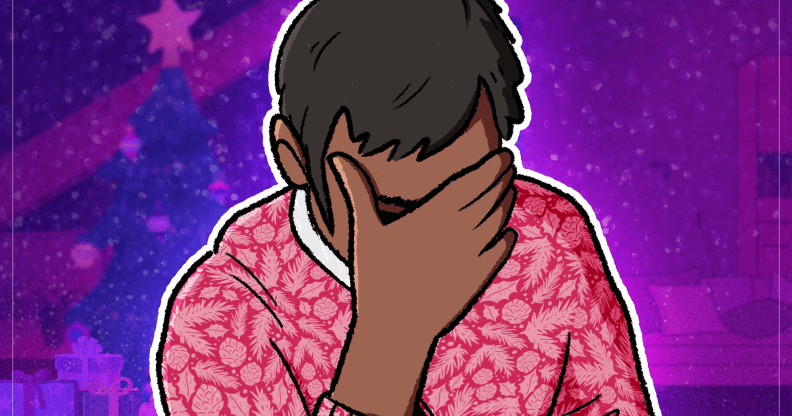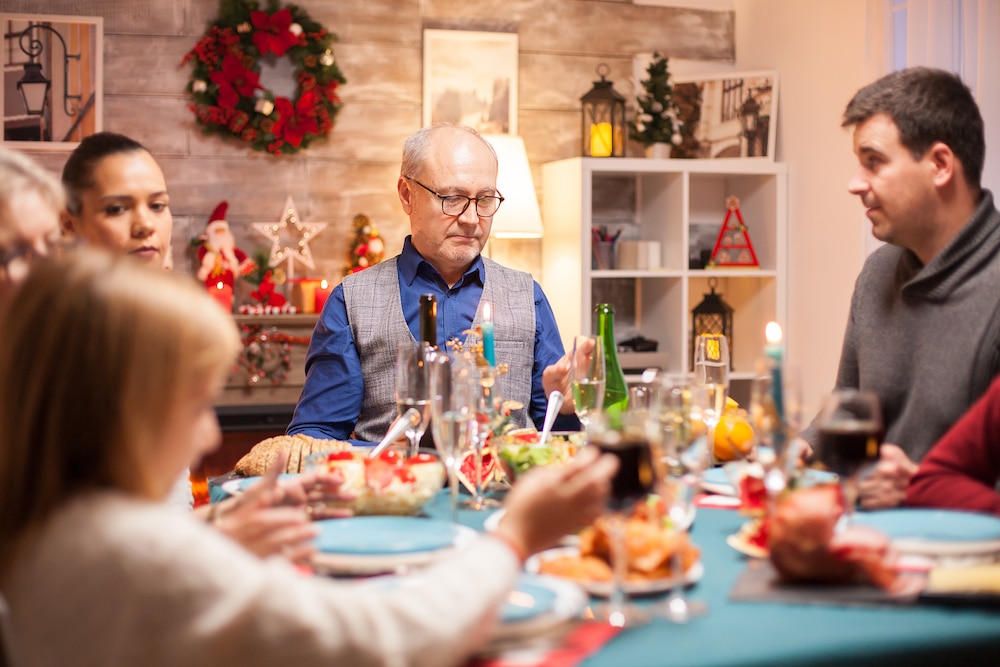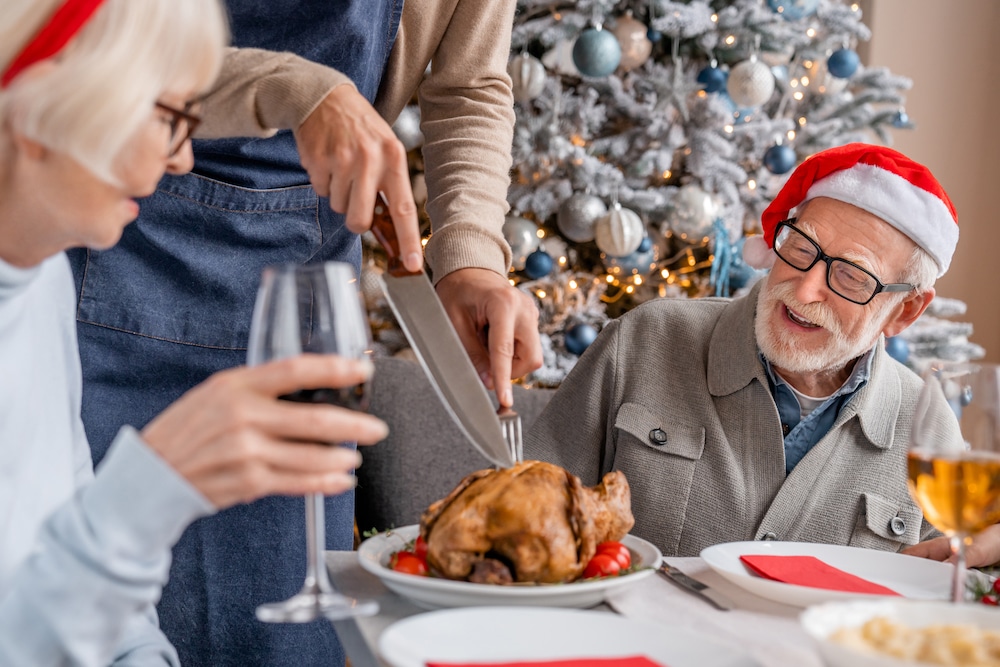Experts share helpful tips for coping with bigoted family members at Christmas

Coping with family isn’t always easy for LGBT+ people at Christmas. (PinkNews)
If you come from an unaccepting family that has repeatedly refused to affirm or acknowledge who you really are, Christmas can be a sad and lonely time of year.
A survey of PinkNews readers backs this up. We asked 7,500 people on social media about their experiences of the festive season. Eight out of 10 said they had to hide who they really are during the holiday season. People shared heartbreaking stories of being deadnamed at the dinner table and being forced back into the closet by bigoted family members.
Chris Grant is founder of The Queer Therapist, an affirming and accredited online therapeutic practice based in Glasgow that works specifically with LGBT+ people. They say that the tension of spending Christmas with unaccepting family members can take a huge toll on a queer person’s mental health.
“There may be instances of maybe not overt transphobia or homophobia, but there may be micro-aggressions – people can pick up on these small things that are said throughout the day, and that can be extremely painful over an extended period of time,” Chris says. The result is that queer people often come away from the festive season with a feeling of grief for what could have been.
“What we’re doing when we’re going home to our families is we’re returning to what is potentially a source of real discomfort,” Chris continues. “That place can throw up a lot of distressing feelings around loss and grief attached to what we would have hoped we might have as children, or teenagers, or even as adults.”
This adds up to create a deep sense of unease for queer people in the lead up to Christmas – and it’s even worse for those who are not out to their families.
“The enormous work and energy that goes into performing and masking – that’s a huge factor,” Chris says. “There are a lot of people who will be gender-diverse who will not disclose these things. So for instance, they may revert back to using their old pronouns or their deadname – things like that.”
As a result, a lot of LGBT+ people end up feeling lonely at Christmas, Chris says – even when they’re surrounded by people who claim to love them.
“It may not be that they’re literally isolated or alone at Christmas – they may be around their family but feel that intense sense of loneliness through the fact that maybe they’re not able to connect on a real emotional level or feel fully accepted in their identities.”
Consider cutting down on Christmas
Chris says queer people need to work through their feelings of guilt or discomfort about not conforming when surrounded by family.
They also suggested that, if possible, people should put in place plans in advance of the festive season to ensure they can minimise contact if they need to.
“There may not be the option to completely remove yourself or extricate yourself from that situation, but instead of going for five days, consider going for three days,” Chris suggests. “Instead of staying in a family home, consider breaking that up with, can I stay with an ally, can I stay with a friend for part of the time or all of the time. Really ask yourself, what is going to support you to get through this?”
They continue: “What we’re talking about here is boundaries and limits. In terms of the day-to-day stuff, I really advocate where possible to speak up and be brave and find new ways of perhaps challenging these micro-aggressions, to communicate that your needs do matter, that you’re part of this family, it’s not a one-size-fits-all. It’s about creating a space that is tolerant of all types of otherness. Learning to speak up and back yourself is really key.” Of course, this all depends on what you feel safe and able to do.
Give yourself ‘time out’
Chris also says people should, where possible, take “time out” from their families.
“Instead of trying to plough through it, give yourself permission to step outside the house. Go for a quick walk, step away, try and de-escalate some of the stuff that’s been really triggering. Breath work is always underrated, but it’s a fantastic strategy.”
These strategies will work for some people, but Chris points out that some will be better off avoiding family altogether at Christmas if they are able to. Some dynamics are too toxic to enter into willingly.
“If we’re talking about really toxic situations, I would certainly be saying to people: ‘Why should you have to put yourself through this?’ If this were friends, you wouldn’t be putting yourself in this situation, you would have cut those friends off. Cutting them off may not be an option, but certainly I think being extremely boundaried in these situations is absolutely valid.”
Know where you can turn to for help and advice
Stephanie Fuller is general manager at Switchboard, an LGBT+ charity that provides support for queer people over the phone and through online messaging. She says Christmas can be a difficult time for LGBT+ people who might have moved away from their families to build “full and authentic” lives, only to be thrown back into the “pressure cooker” when visiting for the holidays.
“We see that in the calls to Switchboard, that people have really struggled because they’re back in a setting or they’re excluded from a setting that they should be able to be their whole self in, and that just cannot be,” Stephanie says. “The ramifications of that run really, really deep and ultimately that affects people’s mental health, it affects their relationships with those closest to them, and that can build a long term distrust when it comes to the idea of being loved, because if the people that are supposed to love you don’t, it makes you question it about anybody who later comes into your life.”
It’s also the case that many people will still be living at home, either with unaccepting family or with extended family members who they’d rather not be around.
Stephanie recommends that queer people who feel worried about Christmas save Switchboard’s number on their phones beforehand. She also says people can contact the charity through instant messaging, which she notes might be more appealing if you don’t want to be overheard.
“I’d certainly say that having access to Switchboard’s number would be a useful thing to have because you never quite know when you’re going to need it. We are there 365 days a year, 10am to 10pm.”
Readers affected by the issues raised in this story are encouraged to contact Switchboard on 0300 330 0630. People can also call Samaritans on 116 123 (www.samaritans.org) or Mind on 0300 123 3393 (www.mind.org.uk).
Readers in the US are encouraged to contact the National Suicide Prevention Line on 1-800-273-8255.




